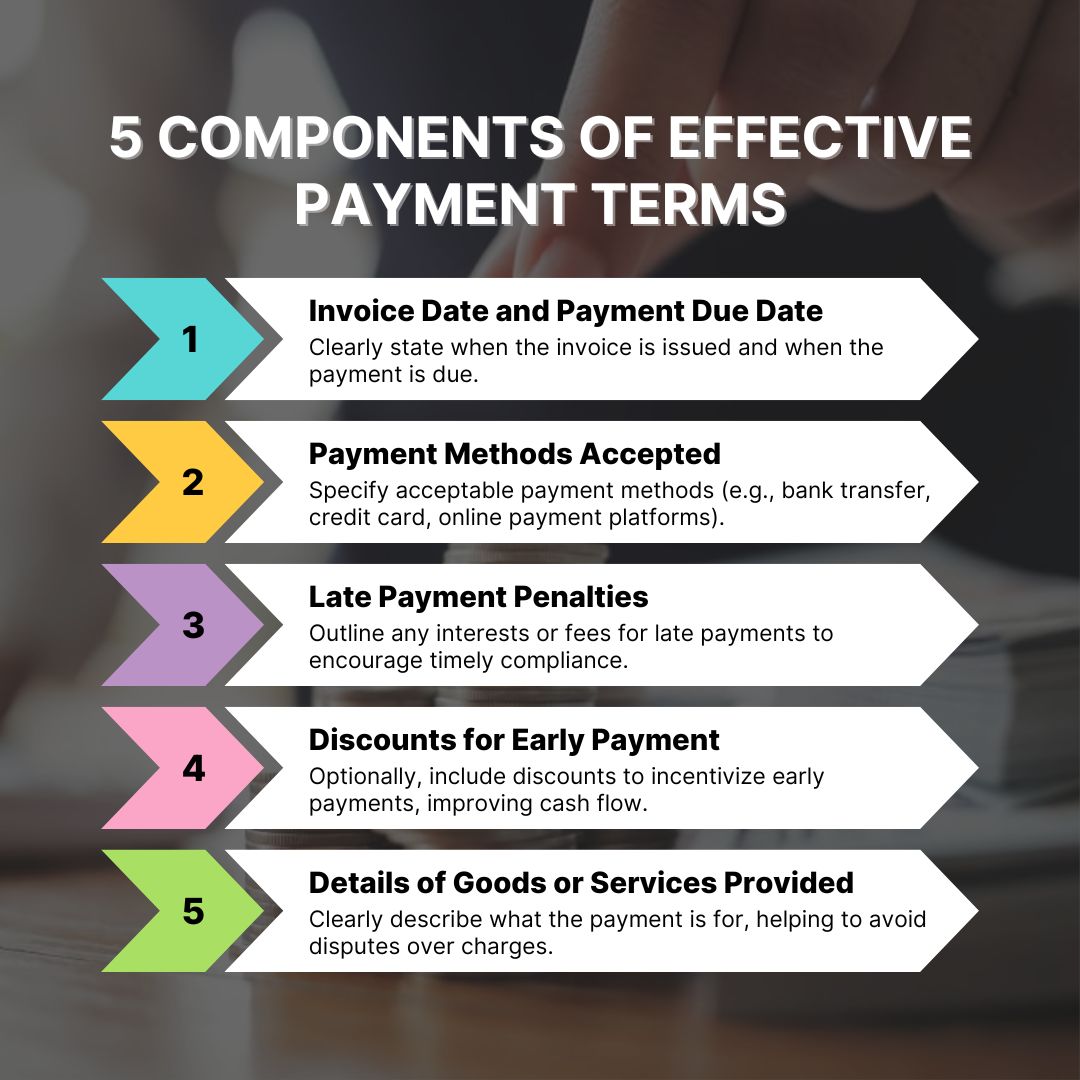In today’s fast-paced business world, the importance of well-defined payment terms cannot be overstated. These terms are crucial not only for maintaining healthy cash flows but also for building and sustaining positive relationships between businesses and their clients or customers. Payment terms, which outline how and when payments should be made for goods and services, play a pivotal role in the financial dynamics of business operations. This article delves into the significance of these terms, explores best practices for their formulation, and discusses strategies to ensure they are both clear and fair, benefiting all parties involved.
Understanding the Importance of Payment Terms
Payment terms are essentially the conditions under which a seller will complete a sale. They cover the amount to be paid, the deadline for payment, and any discounts for early payments or penalties for late payments. These terms are not just a formal part of business contracts; they are fundamental to managing revenue streams and can significantly impact the liquidity and operational funding of a business.
For small businesses and freelancers, in particular, well-crafted payment terms are a safeguard against the unpredictable nature of market dynamics. They help ensure that payments are received on time, which is crucial for covering operating costs and maintaining business continuity.
Components of Effective Payment Terms
Effective payment terms should include several key components to avoid ambiguity and ensure there is a mutual understanding between parties:

- Invoice Date and Payment Due Date: Clearly state when the invoice is issued and when the payment is due.
- Payment Methods Accepted: Specify acceptable payment methods (e.g., bank transfer, credit card, online payment platforms).
- Late Payment Penalties: Outline any interests or fees for late payments to encourage timely compliance.
- Discounts for Early Payment: Optionally, include discounts to incentivize early payments, improving cash flow.
- Details of Goods or Services Provided: Clearly describe what the payment is for, helping to avoid disputes over charges.
Setting Clear and Fair Payment Terms
- Be Transparent: Transparency is key in payment terms. Businesses should ensure that terms are clearly communicated and understood before transactions occur. This avoids confusion and helps build trust.
- Be Reasonable with Time Frames: Payment terms should be realistic, giving clients enough time to process payments while ensuring that the business does not experience cash flow issues. Common terms include net 30, net 60, or even net 90, depending on the industry standard.
- Consider Industry Standards: It’s important for businesses to align their payment terms with those commonly accepted in their industry. This not only meets general expectations but also keeps businesses competitive.
- Adapt Terms to Client Types: Tailoring payment terms based on the client type can lead to smoother transactions. Different terms may be necessary for large corporations versus small businesses or individual clients.
Use Incentives and Penalties Appropriately: While penalties can deter late payments, incentives for early payments can foster goodwill and encourage quicker payment. Both should be used judiciously to maintain good client relationships.
Legal Considerations
To enforce payment terms effectively, they should be legally binding. Including the terms in a formal contract, signed by all parties, ensures that they are enforceable in a court of law, should disputes arise. Businesses should consult legal experts to draft these terms to ensure compliance with local and international laws, especially when dealing with overseas clients.

Negotiating Payment Terms
Negotiation is an integral part of establishing payment terms. Businesses should approach these negotiations with a clear understanding of their minimum requirements but also be prepared to make adjustments to accommodate valuable clients. Effective negotiation helps in forging long-term relationships that are beneficial for continued business.
Technology and Payment Terms
In the digital age, technology plays a significant role in managing payment terms. Automated invoicing systems can send reminders to clients about upcoming or overdue payments, which helps reduce the administrative burden of following up on late payments manually. Additionally, digital contracts can be used to ensure that the agreed-upon terms are secured and tamper-proof.
Challenges and Solutions
Despite adhering to best practices, businesses frequently encounter challenges like late payments, which can significantly disrupt their operations and cash flow. One effective solution is to offer multiple payment options, such as credit cards, online transfers, and digital payment platforms. This variety allows clients to choose the method that best suits their needs, potentially reducing delays in payment.
To further mitigate the issue of late payments, businesses should establish a clear and firm protocol for managing them. This includes setting up a system for sending out timely payment reminders before the due date, and following up with more persistent communications immediately after a missed deadline. Regular and structured follow-ups demonstrate to clients that the business maintains rigorous standards for its payment processes, which can encourage faster compliance.
Additionally, businesses might consider using factoring services as a financial strategy to manage cash flow issues arising from unpaid invoices. In this arrangement, a business can sell its outstanding receivables to a third party at a discount. This provides the business with immediate cash, which can be crucial for maintaining operations without having to wait for clients to pay their dues. By implementing these strategies, businesses can better manage their payment collections and maintain steadier cash flow.
Payment terms are not merely administrative details; they are strategic tools that can significantly influence the financial health of a business. By ensuring that these terms are clear, fair, and tailored to both the business’s and clients’ needs, companies can improve their operational efficiency and client relations. As the economic landscape continues to evolve, so too must the approaches businesses take to manage and implement effective payment terms. Keeping abreast of legal requirements and technological advances will help businesses stay competitive and resilient in managing their financial engagements.
Did you find this Legitt article worthwhile? More engaging blogs about smart contracts on the blockchain, contract management software and electronic signatures can be found in the Legitt Blogs section. You may also contact Legitt to hire the best contract lifecycle management services and solutions.
FAQs on Payment Terms
What are payment terms?
Payment terms define the conditions under which payments should be made for goods or services, including deadlines and accepted payment methods.
Why are payment terms important?
Payment terms help manage cash flow, ensure timely payments, and establish clear financial relationships between businesses and clients.
What should payment terms include?
They should specify invoice dates, payment deadlines, accepted payment methods, penalties for late payments, and any discounts for early payment.
How do payment terms affect small businesses?
Effective payment terms are crucial for small businesses to manage cash flow and ensure operational continuity by securing timely payments.
What is a common payment term period?
Common periods are net 30, net 60, or net 90 days after invoice, depending on the industry and business practices.
Should payment terms be flexible?
Yes, being flexible with payment terms can help maintain good client relationships and accommodate valuable customers, but they should still protect the business's cash flow.
How can payment terms be made clear to clients?
Clear communication and inclusion of detailed terms in formal contracts before transactions begin are essential for clarity.
What are the benefits of including early payment discounts?
Discounts can incentivize clients to pay early, improving the business’s cash flow.
How should businesses handle late payments?
Establish clear penalties for late payments and follow a consistent protocol for sending reminders and following up.
Are payment terms legally binding?
When included in a signed formal contract, payment terms are legally binding and enforceable in court.
Can technology help manage payment terms?
Yes, automated invoicing systems and digital contracts can streamline the process, ensuring terms are met and reducing administrative tasks.
What is invoice factoring?
Invoice factoring involves selling your accounts receivable to a third party at a discount to get immediate cash flow.
How can negotiation affect payment terms?
Effective negotiation can tailor terms to fit both parties’ needs, helping establish long-term business relationships.
What is a reasonable late payment penalty?
Reasonable penalties might include a small percentage fee of the overdue amount, calculated monthly, to encourage timely payments without straining client relationships.
Should payment methods be limited?
Offering multiple payment methods can make it easier for clients to settle invoices promptly and according to their preferences.
What challenges do businesses face with payment terms?
Challenges include late payments, disputes over terms, and maintaining cash flow while accommodating customer needs.
How can businesses overcome challenges with payment terms?
Adopting flexible, clear, and legally sound payment terms, utilizing technology, and maintaining open communication with clients can mitigate many common challenges.
What role does legal consultation play in payment terms?
Legal experts ensure that payment terms comply with relevant laws and are enforceable, minimizing potential legal disputes.
How often should payment terms be reviewed?
Regular review, at least annually or whenever there are significant changes in business operations or financial status, is recommended.
How do payment terms impact business-client relationships?
Fair and transparent payment terms foster trust and reliability, crucial for building and sustaining positive long-term business relationships.
